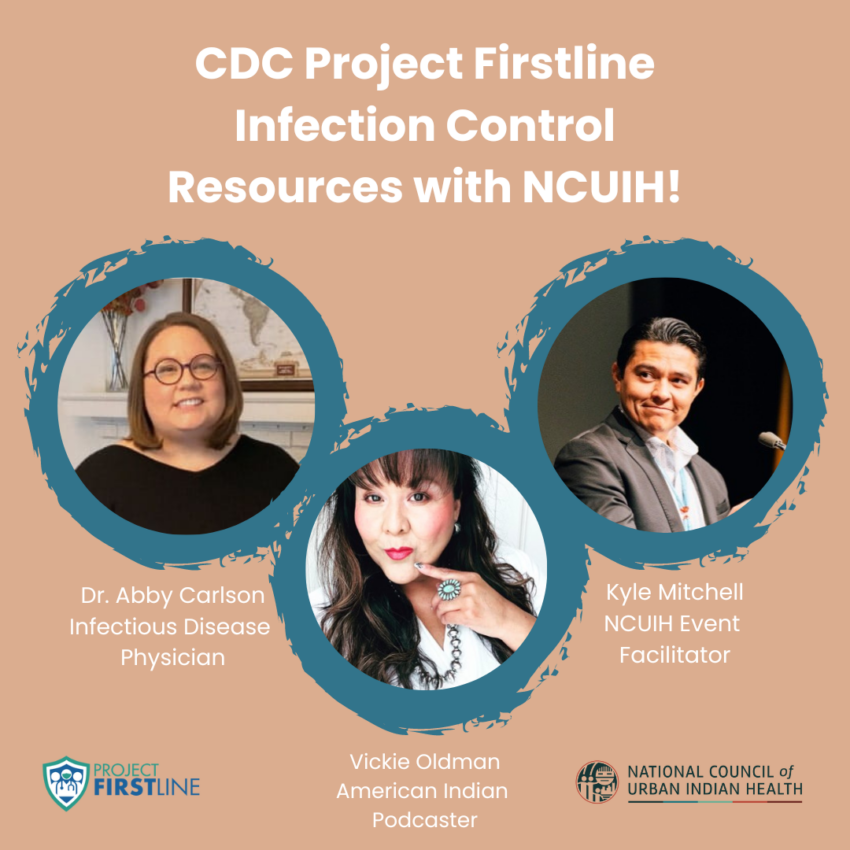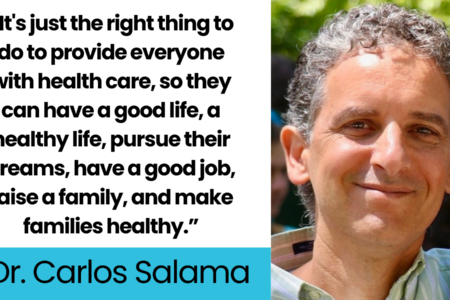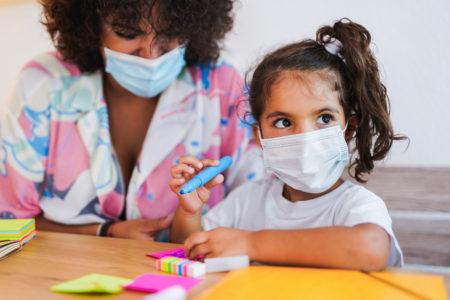
Share On Social!
The US Centers for Disease Control and Prevention’s Project Firstline program provides all healthcare workers – no matter their role or educational background – the infection control training and resources they need to protect themselves, their patients, and their coworkers from infectious diseases.
Now in its third year, Project Firstline is made up of a diverse group of more than 20 healthcare, public health, and academic partners, as well as state and local territorial health departments.
In collaboration with the National Hispanic Medical Association, Salud America! is one of those partners.
To support Project Firstline and our fellow partners, we’re spotlighting impressive infection control resources that are culturally tailored to diverse audiences.
Today, we’re exploring episode 1 of The National Council of Urban Indian Health (NCUIH)’s Native Healthcast, a podcast promoting infection prevention and control education topics for frontline healthcare workers who serve American Indian and Alaska Native patients.
Who is NCUIH?
NCUIH serves as a resource center for individuals and organizations dedicated to improving the health of American Indians and Alaska Natives living in urban areas.
NCUIH provides advocacy, education, technical assistance, training, leadership, and connections to Urban Indian Organizations (UIOs) and others who share their important mission.
The Importance of Storytelling in Infection Control
Hosted by Vickie Oldman, an American Indian podcaster, episode 1 of NCUIH’s Native Healthcast opens with an interview with Kyle Mitchell, a NCUIH event facilitator.
Mitchell explains that, by providing infection prevention and control resources to frontline healthcare workers, NCUIH’s strategy is based in storytelling – a common and well-respected form of communication in the American Indian and Alaska Native culture.
Mitchell describes storytelling as “a fiber of human connection,” which is why much of NCUIH Project Firstline content is in storytelling format, such as the Native Healthcast.
Storytelling is also important in the Latino culture. That is why we tell stories of Latino frontline workers like Anna Valdez and Ricardo Correa as they take action for infection control.
Exploring Healthcare Worker Worries
The podcast shifts to discussing topics covered during one of NCUIH’s January 2022 Project Firstline webinars, “Emerging Infection Control Threats to UIOs.”
Focused on creating “communities of learning,” NCUIH hosts these webinars quarterly to engage frontline healthcare workers in honest discussions about infection control challenges, solutions, and resources for learning.
Host Vickie Oldman introduced her second guest, Dr. Abigail Carlson, an infectious disease physician with CDC, who participated in the webinar.
Dr. Carlson provided insight into topics discussed at the webinar, including healthcare workers’ concerns when it comes to COVID-19 infection control.
“Healthcare workers still feel that they need more training,” Dr. Carlson said. But at the same time, “healthcare workers are exhausted.”
That’s why Project Firstline focuses on “bite-size learning.”
The diverse range of short, easy-to-understand infection control training materials, modules, and videos, allows healthcare workers to “learn what you have time for, and learn what you need quickly,” Dr. Carlson said.
Additionally, Project Firstline offers learning content in Spanish. Partners also help provide culturally tailored infection control learning content.
For example, NCUIH offers an Infection Prevention and Control (IPC) Assistance Center specific to UIOs.
Salud America! offers educational blogs, infection control hero stories, and an opportunity to publicly pledge to take Project Firstline training. A social media toolkit also helps healthcare workers share training opportunities with colleagues via LinkedIn.
Infection Control for COVID-19 Variants
The final topic discussed in the podcast was why and how COVID-19 variants occur.
Dr. Carlson likened COVID-19 variants to dog breeds.
“Some dogs are more or less hyper, more or less friendly, but they’re all dogs,” Dr. Carlson explained. “Variants are kind of the same way. Some might cause a slightly different infection pattern, or be more contagious, but they’re all SARS-CoV-2.”
“Even though there are these small changes in the virus, the virus is still basically constructed in the same way, and it spreads the same way.”
Therefore, infection prevention and control actions don’t change with each variant.
That’s why basic infection control actions, such as cleaning your hands and wearing a mask (when necessary), are so important.
What Can You Do to Promote Infection Control in Your Healthcare Setting?
Help keep yourself, your colleagues, and your patients safe from infectious disease threats, such as COVID-19, by building on your infection control knowledge!
To show your dedication, sign this pledge to complete an infection control training or activity through CDC’s Project Firstline!
You can also share infection control training opportunities with healthcare colleagues via LinkedIn with our Project Firstline social media toolkit.
You can access more information about infection prevention and control in healthcare by visiting resources from CDC Project Firstline.
Salud America! at UT Health San Antonio is working with the National Hispanic Medical Association to bring Project Firstline infection control educational content to healthcare workers, so they are equipped with the knowledge they need to protect themselves, their facilities, and their patients (Latinos and all communities) from infectious disease threats in healthcare settings.
Check out some of the articles from this partnership:
- What is Project Firstline?
- What is the Goal of Infection Prevention and Control in Healthcare Settings?
- What’s a Virus?
- What is Ventilation and Why Does It Matter?
- Contact Time: What is It and How Does it Impact Infection Control?
- The Surprising Difference Between Cleaning and Disinfection
- What’s a Respiratory Droplet and Why Does It Matter?
- We Need to Talk about Hand Hygiene Again
- Why are Gowns, Gloves, and Eye Protection Recommended for COVID-19?
Check out some of the Latino healthcare workers who are heroes for infection control:
- Anna Valdez: Tackling Infection Control with Education from Classroom to Clinic
- Wanda Montalvo: Preventing Infections in Community Health Centers, Latino Communities
- Ricardo Correa: Endocrinologist and Infection Control Leader for the Latino Community
Learn More about Project Firstline!
Editor’s Note: This article is part of a collaboration between Salud America!, the National Hispanic Medical Association, and the CDC’s Project Firstline. To find resources training materials, and other tools to bolster knowledge and practice of infection control, visit Project Firstline and view Salud America!’s infection control content.
Explore More:
Infection ControlBy The Numbers
100
percent
of healthcare workers should focus on infection control




[…] The pandemic is another chapter in the bitter story of American racism and inequality. Black and Latinx people are being infected and are dying at much higher rates than white Americans. Many people of […]
[…] coronavirus has killed over 61,000 Latinos in America according to the CDC, accounting for over 18.2% of the total COVID deaths in the […]
[…] Whereas Hispanics make up 11% of D.C.’s inhabitants, they signify 19% of the COVID cases, and 14% of the deaths. Equally, 46% of D.C.’s residents are Black, they usually make up an alarming 75% […]
[…] and historical mistreatment. According to the U.S. Centers for Disease Control and Prevention, Latino and Black American communities are three times more likely to become infected with […]
[…] Covid pandemic has hit the Latino community particularly hard, and data from the nonprofit health equity advocacy group Salud America! shows Latinos lead in the 0-24 age […]
[…] the pandemic, Latinos took major blows, both in terms of COVID-19 cases and also from the economic recession under former President Donald Trump. Nearly half (49%) of […]
[…] the positive trend, the harm may have already been done. The pandemic has disproportionately impacted Latino communities. Reuters reported that election-related or political disinformation that […]
[…] pesar de la tendencia positiva, es posible que el daño ya esté hecho. La pandemia ha impactado desproporcionadamente Comunidades latinas. Reuters informó que la desinformación política o relacionada con las […]
[…] residentes blancos muestran una tasa mucho más baja con 10 muertes por cada 100,000 habitantes(8 9) . Los afroestadounidenses por su parte, denuncian subsistemas de salud que les segregan […]
[…] https://salud-america.org/coronavirus-case-rates-and-death-rates-for-latinos-in-the-united-states/ […]
[…] https://salud-america.org/coronavirus-case-rates-and-death-rates-for-latinos-in-the-united-states/ […]
[…] communities have the second-highest number of COVID-19 cases in the U.S. They’re also more likely to become hospitalized and die from the disease than other […]
[…] total, around 160,000 Latinos were killed by COVID-19. This accounts for 16% of the 1 million deaths in the country. The […]